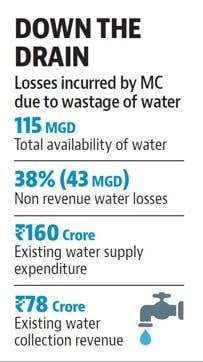No one paying up for 38% potable water in Chandigarh
Leakages, water theft leading to losses; MC commissioner says 24-hour water supply project under Smart City Limited will plug them
About 38% of water supplied to the city is lost due to leakage and illegal connections, reveals the latest Chandigarh Smart City Limited (CSCL) study for its upcoming 24-hour water supply project.

The report refers to this as non water revenue (NRW) losses, that is the quantity of water ‘lost’ before it reaches the consumer.
Underground water leakages and illegal connections in the city’s colonies were causing losses, said municipal corporation (MC) commissioner KK Yadav, adding that MC frequently detected punctur-
ed water pipelines in the
peripheries.
The civic body had been unable to create infrastructure to reduce NRW due to gap between water supply revenue and expenditure, Yadav said, as the aim was to bring down losses to 5% as part of the MC’s proposed 24-hour water supply project.

A pilot project in Manimajra had the mandatory provision of replacement and upgrade of underground pipelines and smart metering to bring down the NRW to the desired level. A similar model will then be put in place for the rest of the city, he said.
MC boasted of water availability of 115 million gallons per day (MGD), which included 87 MGD from canal water and 28 MGD from tubewells.
If CSCL is believed, water availability in the city is not more than 72 MGD since 43 MGD water (38%) is lost in transit or remains unaccounted for due to illegal connections.
This would mean a substantial loss as the civic body recently spent ₹200 crore to pump 29
MGD of canal water by commissioning 40 km pipelines under phases 5 and 6 of the Kajauli waterworks. High levels of NRW are also detrimental to MC’s water supply losses that will almost touch ₹100 crore by the next fiscal.
Hitesh Puri, chairman, Chandigarh Residents Associations Welfare Federation (CRAWFED) told the Hindustan Times on Monday that the MC’s threefold hike in water tariff was made on the grounds that it had to bridge its water supply losses. “But somehow MC itself is responsible for such huge losses as it did not check its own internal failures and is now making people pay for it,” Puri added.
“What the MC lacks is systemic reform. It spent ₹200 crore to increase water availability but did nothing to bring down water losses. Water is precious, it should not be wasted,” Puri said.
Water was lost due to leakages on surfaces too, complained city resident LR Budaniya. “I have sent several videos to MC engineering staff on water wastage by did not get prompt responses from them,” he said.
The CSCL report said the extent of NRW in Chandigarh should be as per the Centre’s standard benchmark, which was between 15% and 20%. In the city it was almost double the national guidelines, despite the fact that Chandigarh was the country’s first planned city.
The need of the hour, the report suggested, was to improve infrastructure for efficient delivery of water, smart metering and billing and performance based operation and maintenance system to reduce water losses.
Benefits of NRW reduction included financial gains from increased water sales or reduced water use.






